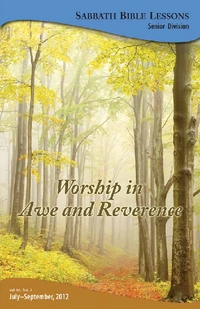Foreword
Rebellion is in the very air we breathe. The philosophy of pleasing oneself seems to be the keynote of our age. In an era when coldhearted cynicism and blatant, hardened iniquity are so prevalent, the old-fashioned quality of “wide-eyed innocence” known in earlier days has now become nearly extinct.
The concept of reverence is a direct contrast to today’s casual, self-centered attitudes. Reverence is defined as honor mixed with love and awe. It implies a humble, childlike wonder that is very precious and rare nowadays, even among the professed people of God.
The lessons for this quarter, entitled Worship in Awe and Reverence, are designed to strengthen and enhance our appreciation of the beautiful graces of reverence and respect that should freely flow from the hearts of worshippers of the true God. Only with this deep sense of awe and wonder at the marvelous creative and redeeming power of our Lord, can we press on in the footsteps of holy men and women of old and prepare our souls for the glories of eternity.
“Some seem to think that if a man has a wholesome fear of the judgments of God, it is a proof that he is destitute of faith; but this is not so.
“A proper fear of God, in believing His threatenings, works the peaceable fruits of righteousness by causing the trembling soul to flee to Jesus. Many ought to have this spirit today and turn to the Lord with humble contrition, for the Lord has not given so many terrible threatenings, pronounced so severe judgments in His Word simply to have them recorded, but He means what He says.”—The SDA Bible Commentary [E. G. White Comments], vol. 6, p. 1100.
“There should be an intelligent knowledge of how to come to God in reverence and godly fear with devotional love. There is a growing lack of reverence for our Maker, a growing disregard of His greatness and His majesty. But God is speaking to us in these last days. We hear His voice in the storm, in the rolling thunder. We hear of the calamities He permits in the earthquakes, the breaking forth of waters, and the destructive elements sweeping all before them. We hear of ships going down in the tempestuous ocean. God speaks to families who have refused to recognize Him. . . .
“When the still small voice which succeeds the whirlwind and the tempest that moves the rocks out of position, is heard, let all cover their face, for God is very near. Let them hide themselves in Jesus Christ; for He is their hiding place. The cleft in the rock is hidden with His own pierced hand while the humble seeker waits in bowed attitude to hear what saith the Lord unto His servant.”—Selected Messages, bk. 2, pp. 315, 316.
SABBATH, JULY 7, 2012
First Sabbath Offering for a chapel in Nagaland, India
Nagaland is largely a mountainous state with abundant natural beauty, located in the northeastern end of India. The population is more than 90% Christian.
The people of Nagaland are of Indo-Mongoloid origin and are warmhearted and very hospitable. Christianity found its way to this land in 1841.
Notwithstanding that the present truth has been propagated here since the work began in India in the early 1970s, it has not been easily accepted. Why? As can be deduced from the statistic that over 95% of the state's population follow Christianity, it is the traditional version that they follow—and that with great zeal like zealots. Hence, fruits were not seen until the turn of the century. After several years of constant labor, a few interested souls could be found and now a few groups and churches have been established. Most of these groups and churches congregate in private homes or at hired places. Now it is high time for us to erect monuments for the Lord.
The pen of inspiration tells us, “You will soon be without a place in which to assemble to worship God. Shall we arise and build? The Lord wants you to be liberal. The members of the Macedonian churches were in deep poverty, yet they urged the apostles to receive their freewill offerings and were willing to go beyond their power to help the saints in Jerusalem who were in greater need than themselves. We have in this record, a lesson for our instruction” (The Review and Herald, September 4, 1894).
When the Israelites were bidden to give for the building of the tabernacle, they gave cheerfully and willingly of the blessings they had received from the Lord. As we discern the specifics of God's will in accordance with the means He has supplied and entrusted to us, we can make our offering overflow through God's supply and “taste and see that the Lord is good” (Psalm 34:8).
We, the believers of Nagaland, come to you, appealing for your generous and willing support through your means and prayers, that this project of building a holy temple for the Lord can materialize.
Thank you in advance for your kindhearted support!
Your brethren and sisters from Nagaland
The General Conference Sabbath School Department

